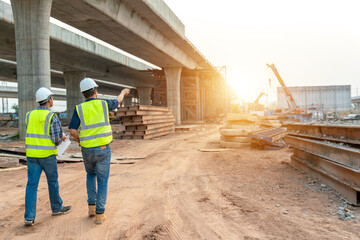Commercial Concrete Contractors Dallas TX are specialized professionals who construct and repair commercial concrete structures. These projects include pouring new concrete foundations and floors and repairing existing ones.
 They must also understand and adhere to local building codes and regulations. This is especially important in commercial construction, where strict standards must be followed to ensure the safety and structural integrity of the finished product.
They must also understand and adhere to local building codes and regulations. This is especially important in commercial construction, where strict standards must be followed to ensure the safety and structural integrity of the finished product.
When it comes to commercial concrete construction projects, site preparation is essential. It ensures that the building is constructed on a strong foundation, helps prevent construction delays and enhances the overall quality of the project. Site preparation can involve a wide variety of activities, including excavation, grading, soil testing and landscaping. It is important to hire a professional company that is experienced in preparing sites for concrete construction.
The first step in the site preparation process is to clear the construction site of any existing structures and trees. This can be done using a range of heavy equipment, including bulldozers and backhoes. It is also necessary to remove any underground pipes or cables that may interfere with the construction process. Once the construction site has been cleared, it is important to grade and compact the soil. This will improve the strength of the foundation and decrease the permeability of the soil, which can lead to cracking in the structure.
It is also important to ensure that the site is accessible for all workers and machinery. This can be done by creating access roads to the construction site and around it. In addition, it is a good idea to create a gravel parking lot and staging area for construction materials and equipment. This will minimize construction delays due to muddy conditions.
Once the grading and compaction are completed, the next step is to install the utilities. This includes water, electricity and sewage systems. It is also a good idea to install a temporary fence to protect the site from theft and other hazards.
It is also a good idea to test the soil for its suitability for the building. Different types of soil have different load-bearing capacities. In order to determine whether the soil can support the building, a geotechnical report must be prepared. This report will provide information about the type of soil, its density and other factors that are relevant to a building’s foundation. If the site is not properly prepared, it could result in expensive construction delays and structural failures.
Pouring the Concrete
Concrete contractors are responsible for the construction of foundations, slab floors, and other concrete work. They typically handle every step of the process, from mixing ingredients to building the formwork. They also supervise delivery and pouring to ensure that the concrete is installed properly.
Before the concrete is poured, it is important to prepare the site. This includes removing any debris and laying down a tarp to protect the area from rain. It is also crucial to make sure that all of the necessary equipment is onsite, including a mixer and wheelbarrows. It is also a good idea to consult with an engineer or structural contractor to determine the best way to pour the concrete on the site.
Once the concrete is poured, it must be leveled and smoothed. This can be done using a hand or power trowel. It is also critical to ensure that the concrete is placed in proper formwork and around any reinforcement.
A key challenge for concrete contractors is dealing with the weather during concrete pouring. If possible, it is a good idea to avoid heavy, frequent, or prolonged rains when working with concrete. This can cause a variety of issues, from water pooling in trenches to segregation of the concrete. In addition, it is necessary to limit the rise of temperature in the concrete and maintain a consistent temperature throughout the batch.
When working with mass concrete industrial projects, it is essential to follow strict safety standards and adhere to all industry best practices. This includes maintaining strong and efficient formwork, ensuring that all equipment is onsite before the concrete pouring begins, and placing anchor bolts accurately. It is also important to communicate openly with the client and provide updates about the project. This can help avoid unexpected delays and keep the project on track.
Finishing the Concrete
The popular saying that “you don’t know a man until you’ve walked in his shoes” is especially true of concrete contractors. Before a concrete contractor can manage a crew and oversee the construction of projects for commercial or residential buildings, they must have extensive experience as laborers on concrete construction crews. A strong work ethic and the ability to follow detailed instructions are necessary for any concrete worker, but a professional concrete contractor also needs to be knowledgeable of industry standards, safety regulations, and best practices for construction.
Concrete contractors must also be able to work with architects, general contractors, and on-site supervisors to ensure that their work is in line with the project goals. Many concrete contractors will use project management software to track progress and communicate with clients throughout the construction process. This can help avoid costly mistakes that may lead to expensive changes later in the process.
Once the forms are set, concrete is poured, and the slab has been compacted and cured, it’s time to start finishing. This includes a process called troweling that creates a smooth surface and brings the concrete to its final grade. This can be a lengthy process involving multiple workers. It’s also the time when a concrete finisher can add decorative elements to the concrete. This might include staining, stamping, or stenciling.
Another important part of finishing is cutting and edging the concrete. This is done to provide rounded or beveled edges on the concrete, which helps reduce cracking. It’s a process that requires special tools and training to master.
A good concrete contractor will have a full toolbox and the right equipment to get the job done. This is often more cost-effective than renting specialty equipment or waiting for a rental company to deliver the tools you need.
Maintaining the Concrete
Concrete contractors are responsible for a wide range of tasks when it comes to commercial construction projects. They work closely with architects, engineers and construction managers to ensure that all of the concrete work meets required specifications and regulations. This includes everything from pouring foundations and floors to constructing walls and providing structural support. Commercial concrete contractors typically have a large team of experienced workers and a fleet of specialized equipment that allow them to complete projects efficiently and on schedule.
In the past, concrete contractors often prepared the concrete themselves, but with ready mix plants available in most areas this is no longer necessary. However, many still do this as it gives them greater control over the finished product. This allows them to ensure that the concrete is of the highest quality and will meet the required standards for the project.
When concrete is poured, it can crack or develop other problems over time. This is often caused by a number of factors, such as an improper mixture of water and cement or the ground being uneven. A certified concrete contractor can assess the problem and provide solutions, such as resurfacing or replacing the damaged section of concrete.
During the course of a project, concrete contractors will also need to keep other contractors and construction managers updated on progress. This is important because it will prevent any delays or setbacks that could impact the overall completion date of a building or structure. Concrete contractors will often use project management software to communicate updates quickly and accurately.
In addition to completing concrete construction projects, commercial concrete contractors also perform repairs and maintenance on existing structures. This can include repairing cracks, resurfacing and patching, and leveling. They can also help with foundation repair, which may involve excavating and backfilling the area, removing tree roots, compacting, and pouring a new base. In some cases, this may be more cost-effective than removing and replacing the entire foundation. A concrete contractor can also offer advice about the best type of concrete to use for a particular situation.
